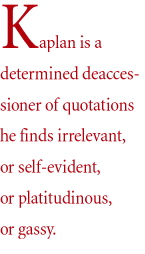Man of letters (and movies, and newspapers, and television) Justin Kaplan '45, G '47, lives in a roomy, hundred-year-old house on Francis Avenue in Cambridge. Especially luminous members of the Harvard faculty have houses all around him. Kaplan cohabits with the novelist Anne Bernays (his wife), two cairn terriers, a beagle, and a cat. Three children and six grandchildren occasionally attend.
Kaplan is editor of Familiar Quotations, first compiled by Cambridge bookseller John Bartlett and published by him in 1855 in an edition of 1,000 copies. (Bartlett lived on another fabled Cambridge street, Brattle, and Professor Henry Wadsworth Longfellow, LL.D. 1859, was one of his near neighbors.) Kaplan was editor of the sixteenth edition of the book (1992), which he refers to in his preface interchangeably as Familiar Quotations, Bartlett's Familiar Quotations, and simply Bartlett. He sent the manuscript of the seventeenth edition to the publisher, Little, Brown, in June, and it's due out in 2002. Kaplan is still making additions and deletions to and from the manuscript.
One enters the Kaplan-Bernays house to a vestibule cluttered with coats, hats, boots, and other outdoor impedimenta. The first room off the long central hall is Kaplan's office, chockablock with books. On his desk is a computer and a small fountain that flows water over stones. Next to the desk is an overstuffed armchair draped with protective cloths. The cairn terriers rush to greet a visitor at the door and then rush to sit side by side in this chair. They look up, bright-eyed and most friendly, and it is clear that they do not expect to move. "I think we would be comfortable talking in the kitchen," says Kaplan.
He leads the way down the hall, past two or three rooms of state with their doors closed to keep the animals out. Kaplan is the author of Mr. Clemens and Mark Twain, for which he won a Pulitzer Prize and a National Book Award; of Lincoln Steffens, A Biography; of Mark Twain and His World; and of Walt Whitman, A Life, for which he again won a National Book Award. Bernays has written eight novels, most recently Professor Romeo, and is at work on a ninth. She and Kaplan have collaborated on a book, The Language of Names, and are nearly done with a second together. Its working title is Back Then: Two Lives in New York in the 1950s; they are avoiding the M-word because Kaplan is sick of reading things called memoirs. They were married in the mid fifties and left New York in 1959 for Cambridge, drawn by Widener Library, the pleasures of the riverbank, and the belief that children could be more easily raised away from Gotham. "You could have animals, too, in Cambridge," says Kaplan, "without worrying about them jumping out of windows."
 The kitchen on Francis Avenue is commodious and contains a long wooden table, potted plants in various states of health standing here and there, and a wall of glass looking out this day on a snowy garden. By and by one of the cairns, Daisy, a sandy blonde, comes in and stands for about five minutes over a heating grille. The blast of hot air from the basement lifts her feathers like Marilyn Monroe's skirt over the subway grate. "That dog is adorable," says Kaplan.
The kitchen on Francis Avenue is commodious and contains a long wooden table, potted plants in various states of health standing here and there, and a wall of glass looking out this day on a snowy garden. By and by one of the cairns, Daisy, a sandy blonde, comes in and stands for about five minutes over a heating grille. The blast of hot air from the basement lifts her feathers like Marilyn Monroe's skirt over the subway grate. "That dog is adorable," says Kaplan.
She is, but the topic of the moment is Bartlett. "A quotation book is both intellectual history and cultural montage, a key to past and present taste, memory, and enthusiasms...," Kaplan has written. In his capacity as editor, he is a collector of notable utterances, which begin with an Egyptian text from circa 2650 to 2600 b.c.He is also a curator of worthwhile verbal constructions from our own time, as, for example, from Sesame Street: "Me want cookie!" He is a connoisseur of the collection his predecessor editors assembled--which now represents layer upon layer of editorial judgments--and he is a determined deaccessioner of pieces of it he finds irrelevant, or self-evident, or platitudinous, or gassy.
His are awesome responsibilities. But they could not be shared. When the now-retired William D. Phillips of Little, Brown invited him to edit the book, Kaplan made clear, "Either I do it alone, or I don't do it. But we don't do it by committee." It was an "irresistible project. I have loved Familiar Quotations ever since I was old enough to read."
One pressing question, of course, is what utterances by William Jefferson Clinton has the editor included in the forthcoming edition? Kaplan was and is a Clinton supporter, but, he says, "The president was not a great utterer of his sentiments." Clinton gets three entries:
I experimented with marijuana a time or two. And I didn't like it, and didn't inhale, and never tried it again.
--New York Times, March 31, 1992I am going to say this again: I did not have sexual relations with that woman, Miss Lewinsky.
--Television interview, January 26, 1998It depends on what the meaning of the word "is" is. If the--if he--if "is" means is and never has been, that is not--that is one thing. If it means there is none, that was a completely true statement.
--Grand jury testimony, August 17, 1998
Kaplan considers the second of these remarks one of the trademark utterances of the decade.
After the sixteenth edition of Bartlett appeared, Kaplan took heat in the press for showing a bias against President Ronald Reagan. The book had 35 FDR entries, 28 JFK entries, six for Carter, but only three for the Great Communicator, and those appeared to have been chosen to make Reagan look silly. Kaplan was quoted as saying, "I'm not going to disguise the fact that I despise Ronald Reagan."
Today, contrite, he has taken out what he calls the stupidest Reagan statement and has added two kinder ones for the upcoming edition, for a total of four, including "Come here to this gate! Mr. Gorbachev, open this gate! Mr. Gorbachev, tear down this wall!" "I've done him better," says Kaplan. He has also augmented Bob Dylan's entries, "the popular poet of the day," and beefed up Stephen Sondheim, Vladimir Nabokov, Charles Darwin, Seamus Heaney, Virginia Woolf, and others.
Hillary Rodham Clinton, pre-senatorially, gets three entries, same as Bill:
I suppose I could have stayed home and baked cookies and had teas.
--Press interview on conflict of interest, March 17, 1992The great story...is this vast right-wing conspiracy that has been conspiring against my husband since the day he announced for President.
--Today, NBC-TV, January 27, 1998We've been married for 22 years. And I have learned a long time ago that the only two people who count in any marriage are the two who are in it.
--Ibid.
(See also an entry for Diana, Princess of Wales, another newcomer to the book: "There were three of us in this marriage, so it was a bit crowded.")
Hillary Clinton gets into the book in a footnote, too. In a 60 Minutes interview in 1992, she stressed "that her defense of her husband against charges of adultery was more than routine," Kaplan writes. She told 60 Minutes, "I'm not sitting here like some little woman standing by my man like Tammy Wynette." Kaplan gives readers a stanza of "Stand by Your Man," written by Wynette and her producer, Billy Sherrill. He notes in conversation that Wynette resented being brought into the adultery discussion in this way, and that Clinton wrote her to apologize.
Kaplan was glad of the chance to include the late singer and songwriter in the forthcoming Bartlett, to broaden its base. "The book was so Beacon Hill-oriented before, you couldn't believe it," he says. "Some people thought I'd let in the barbarians at the gate when I let in the Cookie Monster, that I had demeaned the high tone of the book." He had let in popular culture.
"I make no claim that everything in the book is immortal," he says. "Some things will have a life of only 10 years, and will be excised from the next edition, but they represent what people are thinking about today."
Kaplan is formidably well read. But mindful of research showing that almost 60 percent of adult Americans claim never to have read a book and are getting their nourishment elsewhere, he searches for memorable material not only in books but in nonliterary places--rock and pop lyrics, the movies, the business and sports worlds, politics.
With few exceptions, television is not memorable, he finds, which proves that little is expected of television writers. "Seinfeld, for instance, ran for something like nine years, but hardly a vestige of a Seinfeld script survives in the public mind except a few scraps like 'Not that there's anything wrong with that.'" ("Yadda yadda" did not gain admittance to the seventeenth edition; "too much of a scrap," says Kaplan.) One of the exceptions to the vacuity of television was Monty Python's Flying Circus. Who, having heard it, could forget: "This parrot is no more. It has ceased to be. It's expired and gone to meet its maker. This is a late parrot. It's a stiff. Bereft of life, it rests in peace. If you hadn't nailed it to the perch, it would be pushing up the daisies. It's rung down the curtain and joined the choir invisible. This is an ex-parrot."
In general, the movies are a much better source of the relishable. Casablanca has four entries in the current edition. In the upcoming one Kaplan also preserves a delicious moment from Nora Ephron's When Harry Met Sally. "I'll have what she's having," says actress Estelle Reiner, ordering a meal in Katz's Deli, where Meg Ryan is faking an orgasm at a nearby table. From The Silence of the Lambs, by Thomas Harris and Ted Talley, he takes Anthony Hopkins's deathless line: "I ate his liver with some fava beans and a nice Chianti" (see page 70). Kaplan's position, he has written, is that "John Donne's magnificent 'Death be not proud' belongs in Bartlett. But so, too, does Woody Allen's 'It's not that I'm afraid to die. I just don't want to be there when it happens.'"
Kaplan plows through newspaper editorials as a source for the latest buzz quotations. "Something someone says is picked up and repeated everywhere for a time. Brendan V. Sullivan Jr., representing Oliver North during the Senate's Iran-contra hearings in 1987, said in exasperation when Senator Daniel Inouye seemed not to know what Sullivan's function was, 'I'm not a potted plant. I'm here as the lawyer. That's my job.' Suddenly, everywhere one looked someone was saying, 'I'm not a potted plant.'" Sullivan's assertion is scheduled to appear in the seventeenth edition.
Kaplan is a faithful reader of obituaries.
"Do you know who Jimmie Davis was?" he asks. "I'm quizzing you."
His visitor looks blank.
"He died in November, believed to be 101," Kaplan prompts.
Still blank.
"He was governor of Louisiana and wrote one of the most popular songs of the twentieth century, 'You Are My Sunshine.' I've got to get that in the book."






